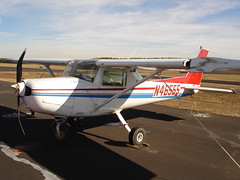January 31, 2006
Amr Was Right
I stopped by Amr's cube on my way out the door tonight (which is easy, since we sit like 15 feet from each other) and said "you were right!" And followed it with "now everyone is waiting for you to respond..."
So he did.
Now its time to gloat :) Google earnings are out, their sequential gross revenue growth was 22%, which did not just miss the 30% that the bulls were predicting, but also barely met the lowest of the sequential growth estimates (which was around 23%).
While I didn't say much earlier about this, I was surprised by the number of folks who didn't take what he said seriously. Amr really knows his stuff. And now he's all famous on the internets as a result.
Darth PowerPoint
I've seen a lot of "PowerPoint is Evil" spoof images, but this one is just terribly amusing:
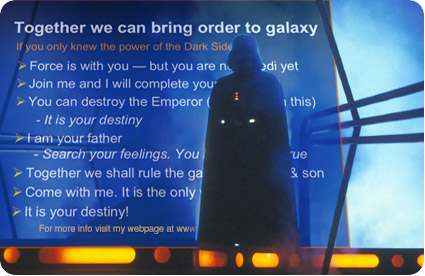
For the rest of the story, including Yoda's presentation style, check out the Presentation Zen blog. There's good stuff there for anyone making presentations.
Garmin Streetpilot c340 GPS Mini-Review
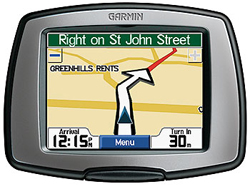 For the last several months, I've been driving with a Garmin Streetpilot c340 GPS unit in my car. I first experienced the utility of this GPS when visiting Taiwan back in November. On the last day of the trip (a Saturday), my host picked me up in his car and had a multilingual C340 that he used to navigate the area.
For the last several months, I've been driving with a Garmin Streetpilot c340 GPS unit in my car. I first experienced the utility of this GPS when visiting Taiwan back in November. On the last day of the trip (a Saturday), my host picked me up in his car and had a multilingual C340 that he used to navigate the area.
I was impressed with the size, speed, accuracy, and functionality. It didn't take long before I decided it'd be far better than the navigation software I occasionally used on my iPAQ PDA. I've had it roughly two months and am still relatively pleased.
The Good:
- excellent screen
- easy to move into a second vehicle using the suction cup mount
- internal battery that keep the unit working if you unplug it
- voice navigation pronounces most names correctly (even in California)
- satellite acquisition time is generally quick
- USB connection and software to upgrade maps
- route re-calculation is snappy
- it's easy to store favorite location
- many ways to find a destination (by name, address, intersection, etc.)
- arrival time estimates are surprisingly good
The Bad:
- it occasionally chooses bad routes for destinations I've driven to using it before
- finding a business name in its database has been hit or miss in my experience
- the traffic service costs extra (I don't have it)
there's no way to see an overview of a route before you begin driving it- it always crashes at one spot in Berkeley
In summary, it's a great GPS for most city driving. If you've ever used the GPS systems built into some rental cars, it'll take almost no time to get started with the Garmin c340.
January 30, 2006
Broken As Designed (BAD)
It's funny how some services scream their inadequacy at us, yet we continue to use them. A case is point is the technology used at work to get access to a "webcast" presentation. Every single email that I ever remember seeing about this contains a URL to the presentation and then these disclaimers (err, I mean "instructions"):
- You must be using Internet Explorer on Windows.
- You must disable *all* pop-up blockers.
- Remember to disable *both* the toolbar and the OS pop-up blocker.
Every time I read that I think "Broken As Designed", which can conveniently be remembered as "BAD", and wonder why we haven't replaced it with a more simple platform neutral system that doesn't require pop-ups in and an insecure browser.
I think that folks who've not been on the inside of a "high-tech" company would be amazed at how often the internal technology is considerably worse that what they make available to their customers. This seems to ring true with folks I've talked with at many, many other companies. (See also: Fortune Cookie Wisdom for Self-Assessments)
If there were decent access controls in place, perhaps Google Video or YouTube would be better options. (Heh)
Someone AJAXified mytop!
Check this out. Someone has built and AJAX powered version of mytop, the little console based MySQL monitoring tool I wrote years ago. I guess it's now buzzword compliant.
If you can't wait to get your hands on it, head over to the AjaxMyTop project on SourceForge.
Everything old is new again. :-)
January 27, 2006
Has Google Lost Its Soul?
We all knew it was a matter of "when" not "if", but it's surprising to see that it had to happen this way. Over on Google Blogscoped, I see that Google Removes Its Help Entry on Censorship:
The page which used to say:
Google does not censor results for any search term. The order and content of our results are completely automated; we do not manipulate our search results by hand. We believe strongly in allowing the democracy of the web to determine the inclusion and ranking of sites in our search results.
Now simply 404s. It's gone. Well, except for the cached copy in Google itself.
Rather than using that page to explain how and why they've compromised their corporate philosophy in China, they've removed it entirely with no explanation.
Now, it's entirely possible that they've written a new page and didn't have the sense to update the old one in-place, thereby breaking the URL. But I've been unable to find evidence of that. Can you?
I guess that giant sucking sound coming from Mountain View this week was the sound of Google's soul getting sucked out to make more room for cash. True Colors indeed.
What a sad week in the world of web search, huh? There was the DoJ subpoena, the "Yahoo gives up on search" scare, and now this. I can only hope that this month is over soon.
January 26, 2006
My Four Things
There's this meme going around where you provide lists of four things about yourself. I've not seen any links to the source, but figured I'd play along since I've been tagged and can't muster the brainpower at 8:00am to write anything more substantial.
Four jobs I've had in my life:
- Paperboy
- Grocery checkout bagger
- Computer Lab technical support
- Yahoo! Troublemaker
Four movies I can watch over and over:
- Ghostbusters
- The Sure Thing
- Start Trek II: The Wrath of Khan
- Eurotrip
Four TV shows I love to watch (I don't really watch TV anymore):
- The West Wing
- Whose Line Is It Anyway?
- Star Trek Deep Space Nine
- NOVA
Four places I've been on vacation:
- Colorado
- Tokyo, Japan
- Florida
- Oregon
Four of my favorite dishes:
- Lasagna
- Sweet and Sour Chicken
- Kung Pao Prawns
- Grilled Salmon
Four websites I visit daily:
- Digg (no comment on today's acquisition rumor, sorry)
- Memeorandum
- TailRank
Four places I would rather be right now:
- In Bed
- New Zealand
- Arizona and Utah
- 16,000 feet in my glider
Four bloggers I am tagging (as in "tag! You'e it!" I guess):
Okay, your turn.
January 25, 2006
Kevin Burton of TailRank on Power Source Tonight
 Tonight (5pm Pacific, 8pm Eastern), Tim and I will have Kevin Burton of TailRank and Rojo fame on the air for an hour-long conversation on WebmasterRadio.fm. If you've got questions you'd like us to ask or stuff to talk about, drop a comment here and I'll see what we can do.
Tonight (5pm Pacific, 8pm Eastern), Tim and I will have Kevin Burton of TailRank and Rojo fame on the air for an hour-long conversation on WebmasterRadio.fm. If you've got questions you'd like us to ask or stuff to talk about, drop a comment here and I'll see what we can do.
This is only our second show (first one was last month), so we're still working out some kinks. Feedback is always appreciated. Also, if you can think of anyone (at Yahoo or elsewhere) you'd like us to bring on as guests, fire away!
January 24, 2006
Now hang on a sec...
This week it feels like someone must have cursed our house with a Chinese curse and we've suddenly been thrust into "interesting times." Yikes.
One of the biggest mistakes that some companies made during Bubble 1.0 was to obsess about all the wrong numbers, such as a rising stock price. While it was a welcome distraction from the much harder work of building great products and services, the lack of focus on what matters eventually came back to bite.
Last year I spent the better part of a day in "media training" and learned to be very skeptical of reporters. So when I read the now famous quote: "It's not our goal to be No. 1 in Internet search. We would be very happy to maintain our market share." I stopped for a few seconds to imagine how Sue finished that statement. Something like "...what really matters is building the greatest search services we can" or words to that effect.
But I know that it's more fun to jump to conclusions and write all those doom-and-gloom stories. It sure makes for great headlines, doesn't it?
If you think we're just giving up on search, you haven't been paying attention. Or maybe we've not been tooting our own horn enough? I try to tone down that sort of thing here, but maybe that's exactly the wrong thing to do.
I bet that if we surveyed most searchers about what they'd like us to do, few of them would say "be #1" or "beat Google!" Those things might happen, but they're a byproduct of doing so many other things right (speed, ease of use, good design, relevance, etc).
Dave Taylor said it well:
I don't think it's a confidence issue at all. I think it's everyone succumbing to the win or die! perspective. Yahoo doesn't have to be #1 to be a darn successful search system and extremely useful and valuable to the Internet at large.
Who gets to declare the winner? Journalists? The stock market? Measurement companies? Or you, the searchers?
As Robert Scoble said, "There is so much left to do it isn't even funny." What is funny is watching someone come along every few months to declare "game over!" on search.
January 23, 2006
About that DOJ Request
I've waited several days and thought quite a bit before saying anything about the Department of Justice asking search engines for search data. I waited partly because I didn't want to say something I'd regret, and that was pretty likely to happen early on. And partly because I wanted to see how the companies involved were going to handle the situation. Most did a very poor job.
I was initially tempted to post instructions and screen shots for each major search engine. They'd illustrate, step-by-step, how to sign out and search anonymously--you know, just in case. But that's a lot of work and all I really wanted to say was this: I'm disappointed.
I'm disappointed in the government for wanting to use the online behavior of millions of people in an attempt to justify a law that many of those million are likely against. I'm disappointed in them for making people even more fearful of "being tracked online" and the Bush Administration's attempts to keep an eye on the public.
I'm disappointed in those companies that appeared not to put up a fight, notify their users, or explain what happened in a timely fashion. I'm disappointed in them for not providing an opt-out mechanism. I guess that's everyone but Google so far.
I'm disappointed in the general public for jumping to conclusions about what happened before the story had really been worked out.
I'm disappointed in the media for helping to scare the public. They, like the government, appear to be doing what they're best at and that's pretty troublesome.
I hope that people will stop IMing, emailing, and otherwise asking me what I think of all this and what Yahoo's position is. In case it's not clear, I'm not speaking on behalf of anyone other than myself. And the Powers That Be have decided not to say much on the matter. So there you have it.
Too Fat? Blame the Economy
At least, if you're Michael S. Rosenwald you do. In his Washington Post story Why America Has to Be Fat, he lays out the case for Fat Americans (most are) being Good For the Economy.
 With all due respect to Mr. Rosenwald, who confesses to being 60 pound overweight, you've got to be kidding me! This article is wrong in so many ways that I almost don't know where to begin. The headline alone implies that we have little choice in the matter. The premise that being fat is good for the economy couldn't be more short-sighted. How ignorant of the long-term costs and consequences is this?
With all due respect to Mr. Rosenwald, who confesses to being 60 pound overweight, you've got to be kidding me! This article is wrong in so many ways that I almost don't know where to begin. The headline alone implies that we have little choice in the matter. The premise that being fat is good for the economy couldn't be more short-sighted. How ignorant of the long-term costs and consequences is this?
Before we go any farther, let me get one thing out of the way. I used to be in the majority: a fat American. But 11 months ago, I decided to change all that and do it in a permanent way. As a result, I'm 55 pounds lighter and can't imagine why I didn't do it 15 years ago. So I think I'm entitled to an opinion on the matter.
I could spend all day picking quotes from the article and ranting about how wrong they are, but instead I'll pick just a few of my favorites:
In some ways, we are better off in this Fat Economy. Many people work in easier, better-paying jobs, which help pay for their big homes in the suburbs. Women don't have to spend two hours preparing dinner every night; many have risen to unprecedented levels of corporate and political power. Flat-panel plasma TVs hang over fireplaces, which can be lit using the same remote control for flipping channels. But the unintended consequence of these economic changes is that many of us have become fat. An efficient economy produces sluggish, inefficient bodies.
Okay, we've got all these better paying jobs which make it possible to buy McMansions and hang flat-panel plasma TVs over our fireplaces. And that means we're better off? Are people really happier and less stressed? The stories I read indicate that we're at or near all-time highs for work related stress and anxiety. The lust for a big house with expensive electronics is hardly healthy. Are those what really matter in life?
But hey, it means Big Business makes money, right? In fact, he says as much:
For many corporations, and even for physicians, Americans' obesity has also fattened the bottom line. William L. Weis, a management professor at Seattle University, says revenue from the "obesity industries" will likely top $315 billion this year, and perhaps far more. That includes $133.7 billion for fast-food restaurants, $124.7 billion for medical treatments related to obesity, and $1.8 billion just for diet books -- all told, nearly 3 percent of the overall U.S. economy.
Yippie!
Can you imagine if that $315 billion had been put to use for something productive like, say, education? No, instead it's being used to make up for laziness. Isn't that just a little sickening?
Now, who do we blame for this?
"The obesity problem is really a side effect of things that are good for the economy," said Tomas J. Philipson, an economics professor who studies obesity at the University of Chicago, a city recently named the fattest in America. "But we would rather take improvements in technology and agriculture than go back to the way we lived in the 1950s when everyone was thin. Nobody wants to sweat at work for 10 hours a day and be poor. Yes, you're obese, but you have a life that is much more comfortable."
Wrong!
The obesity problem is a direct result of how fat people eat. Their lack of concern for their own personal health is the problem, not the fact that calorie-loaded food is easier to come by. That's like blaming crime on guns.
On the calories-expended side of the Fat Economy, economists have noted that changes in the workplace have caused us to burn fewer calories. Prior to the 1950s, jobs often meant hard labor. We lifted heavy things. We worked outside. Our desks -- if we had them -- did not come equipped with computers. We lived in urban environments, walking most places.
Doesn’t' that mean we should simply eat less? Or at least exercise more?
"People are just not willing to give up their leisure time," Philipson said. "People don't want to pay to exercise with their leisure time."
Ah ha! There's the real problem. It's laziness. People don't want to exercise unless they're paid to do it. Maybe the headline should have been: Fat Americans Want Money Before Health.
Again, later in the article, there's more evidence that someone understands what's really going on:
"The structure of the economy has made us more obese," Cutler said. "That is clearly true. What businesses do is they cater to what we want, whether what we want is really in our long-term interests or not. So people are obese and they want to diet, but they also want things to be immediately there. Manufacturers and storeowners make that possible. The upside is nobody spends two hours a day cooking anymore."
How depressing that the story is written as if "the economy" is to blame.
January 22, 2006
Visiting the Control Tower at RHV
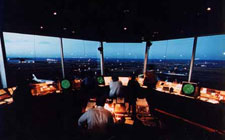 On Saturday I was scheduled to fly for a couple hours in a Citabria, but the weather got the best of things. Instead of worrying about punching through the 1,200 foot ceiling, I took the opportunity to visit the control tower at Reid Hillview Airport (no pictures allowed, thanks to TSA and/or FAA rules) with a few fellow student pilots (Mark and Lance).
On Saturday I was scheduled to fly for a couple hours in a Citabria, but the weather got the best of things. Instead of worrying about punching through the 1,200 foot ceiling, I took the opportunity to visit the control tower at Reid Hillview Airport (no pictures allowed, thanks to TSA and/or FAA rules) with a few fellow student pilots (Mark and Lance).
Getting there
I had called the tower before leaving the house so they'd know we wanted to come by. We had planned a tower visit even before the weather shot down most of the flying. They requested that I call again when we headed over. Doing so meant zero hassle when we arrived at the barbed wire topped security gate that leads to the tower parking area.
We parked, entered the building, and headed upstairs. There we found a couple controllers working the virtually dead traffic of the late Saturday morning. One was handling ground operations and weather. The other took care of folks on the runway and in the air. In addition to the desk and small kitchen appliances, they had mostly low-tech gear: radios, phones, paper, pen, etc.
The Gear
The most important item in the room, aside from maybe the radios, is "the board." I wish I could have taken a picture, but the board is a low-tech device where small movable plastic pieces are labeled for each aircraft. Their position on the board, along with the extra markings on them, tell any controller everything they need to know in a moment's glance: which planes are in the run-up area, who is in the pattern, etc. Well, this means any controller that knows the system they use at the Reid Hillview Tower, since it's not used by the rest of the FAA.
Their high-tech toys consisted of a computer, RADAR system, and a light gun. The computer is for accessing and updating weather information, which also had a bunch of cool reference material on it. For example, if a plane of a model they've never seen before calls in, they can look it up by name and see a nice picture of one. Then they can look out the windows (and they've got one hell of a view!) with their binoculars to verify that it's what they think it is.
They don't have on-site radar, but they do get a local feed from Moffett and a slightly less local feed from Oakland. Their display is customized with all the standard local reporting points, so if you call in "over UTC" or "over IBM" they can spot you in no time. One of the controllers asked a plane to switch transponder codes and identify (push the IDENT button) so we could see what that looks like on the screen. The visual appearance of the target changes in a fairly subtle way.
The light gun is probably something that non-pilots have never heard of before. It's a high-powered source of directed light that the tower can use to communicate with an aircraft whose radio has died. Different colors (red, white, green) mean different things on the ground and in the area. In reality they almost never use it. But their old light guns had problems, so the FAA game them a new high-tech battery powered model that I got to play with for a minute.
Listen for something that doesn't sound normal
We spent the majority of our hour or so up there listening to Steve talk about what goes on, how they work, their equipment, and answering our questions. We learned a lot about local traffic operations, how they assess pilot confidence over the radio (speak confidently and you'll get good treatment!), and other bits of trivia.
The most important advice we heard applies to both pilots and controllers. So much of aviation radio communication is scripted, routine, and expected that one should really be on the lookout for things that don't sound normal. When something doesn't sound quite right, ask for clarification or a repeat. It may have been a simple mistake. Or it may have simply been a problem with the transmission or reception.
And wouldn't you know it? I had such a thing happen to me earlier today. More on that later.
The Verdict
Every student pilot should take the opportunity to visit a control tower and get some quality time with the controllers. You'll learn a lot in a short amount of time. Probably the most important thing you'll learn, aside from the "listen for the abnormal" advice, is that controllers are people too. And they're there to help pilots.
Just like in other forms of technology medicated communication, it's all too easy to make assumptions about someone you've yet to meet in the real world.
Richard Simmons on Whose Line
If I had to make a list of the funniest moments on television in my lifetime, there are three things you can be sure of:
- It wouldn’t contain anything aired after January of 2004 (I don't really watch TV anymore)
- Schwetty Balls would be on it
- The video of Richard Simmons on Whose Line would be on it
Thanks to Aaron for reminding me of that clip. It'd been a while since I saw it. In fact, that might have been back in 2003 when I still owned a Tivo. I recall keeping that episode of Whose Line for at least a month.
January 18, 2006
Dear SourceForge
You're blocking Yahoo! Search crawlers from your site and have been for several days now. We've tried contacting you to verify your intent. Most folks would just add the relevant entries to a robots.txt file, so we're thinking maybe it's a bug in your ACLs somewhere.
Anyway, if you'd like to stay in the search index please contact me and I'll get you in touch with someone on our site who can help sort it out if need be.
If you really do want us out, how about just using robots.txt so we're clear about what's going on?
Thanks!
Update: Thanks for the leads. We got a contact.
January 17, 2006
Work vs. Life Balance in the Extreme
With all the "work vs. life balance" talk one hears from the executives and HR folks in large Silicon Valley corporations these days (thou shalt not burn out), it should (on the surface, at least) be surprising when folks leave with the intent of not working again for quite a while. I have three recent cases in mind.
Ken
First is a guy named Ken. He left Yahoo at the beginning of this year after 4 or 5 years with the company. I had lunch with him on one of his last days. During our discussion I learned that he's planning to spend the next 6-12 months not doing anything in particular. Maybe he'll travel a bit, get back into some hobbies, catch up with old friends, and so on. It turns out that he's done this a few times before. He's a big a fan of working at a company for 3-5 years, not taking much in the way of vacation time, and then taking 6-12 months off before his next job. He'll have no trouble getting another great job when he's ready to jump back in.
Andy
Second is Andy. He's leaving Yahoo in a couple weeks and plans to, quite literally, travel the world. He already has plane tickets to far-flung destinations, a small assortment of gear ready to pack (he's trying to travel light), and quite a list of other places he'd like to see. I'm a little jealous. I've been pretty lucky in that I've been able to travel in my job now and then, even internationally a bit. But I've barely scratched the surface of seeing our little planet. Like Ken, Andy will have little trouble getting back into the flow of things when the time comes.
Nelson
Third is Nelson. He's on leave from Google as of now. It sounds like he's also gonna take some time to relax, travel, and just enjoy life. Nice. I have no doubt that he'll have his choice of work again someday too, should he need or want it.
On Balance
These three got me thinking a bit more about the notion whole work/life balance. It's partly because I've realized that work and non-work time blend together so much nowadays that it's really hard to feel like you're "on vacation" unless you go away for an extended time or forcibly disconnect yourself from the world.
For me it's the two or three weeks last year when I took time off to live in the Nevada desert (or a small town in Utah) with a bunch of glider pilots. We'd have breakfast together in the morning, fly in the afternoon, and enjoy a good dinner at night while discussing our triumphs and failures of the day. I almost never find myself thinking about work on those trips.
What I've concluded from my own experiences and observing others out here is that different people arrive at this balance in different ways. And that's more visible in Silicon Valley than anywhere. At one end of the spectrum are the startup guys who are following the gospel of Paul Graham, which says:
Economically, you can think of a startup as a way to compress your whole working life into a few years. Instead of working at a low intensity for forty years, you work as hard as you possibly can for four. This pays especially well in technology, where you earn a premium for working fast.
They're followed by people like Ken, who dig in for a few years and then take a nice long break.
Somewhere in the middle are those who try to use their vacation time in blocks no smaller than a week. During that time, they try to avoid work related email and discussion if at all possible.
At the other end are those working mostly 9-5 who manage to disconnect everyday when they leave the office.
And you know what? It's all just fine. :-)
This is the point at which all my European readers chime in about how they get 2-3 times the holiday/vacation time that we do and generally live at more leisurely pace...
Comparing Spam Filters: Gmail, Yahoo! Mail, and SpamCop
 Danny Sullivan of Search Engine Watch has been running a quantitative comparison of the spam filtering capabilities of Gmail, Yahoo! Mail, and SpamCop. His first report shows that SpamCop is the most effective, while Yahoo catches the least spam but has the highest false positive rate, while Gmail is in the middle of the road. It's interesting to note that Gmail has zero false positives for Danny.
Danny Sullivan of Search Engine Watch has been running a quantitative comparison of the spam filtering capabilities of Gmail, Yahoo! Mail, and SpamCop. His first report shows that SpamCop is the most effective, while Yahoo catches the least spam but has the highest false positive rate, while Gmail is in the middle of the road. It's interesting to note that Gmail has zero false positives for Danny.
His second report shows similar numbers, though the false positive rate on Yahoo has decreased and Gmail's perfect record is tarnished. In his most recent report we see that Gmail and SpamCop are quite similar in the percentage of spam caught and the false positives. And the flase positive rate on Yahoo is back up in the 5% range.
January 16, 2006
How many ounces in a cup?
For some reason, I can never seem to remember how many ounces are in a cup, cups are in a pint, quart, gallon, and so on. So I'm going to write them down here, secure in the knowledge that I can always search my own damned web site next time I need them.
3 teaspoons is 1 tablespoon
8 ounces is 1 cup
16 ounces is 2 cups which is 1 pint
32 ounces is 4 cups which is 2 pints which is 1 quart
128 ounces is 16 cups which is 8 pints which is 4 quarts which is 1 gallon
Strangely, it's only the liquid measures that give me trouble.
Hey, if you're cooking, you might be interested in our new blog: How To Eat And Live
January 14, 2006
SkyVector is the Google Maps of Aviation Sectional Charts
 Recently someone pointed me at SkyVector.com which can most easily be described as "the Google Maps of Aviation." They've taken the aviation sectional charts for the entire USA, scanned them, broke them up into square "tiles", and provide a smooth click-and-drag panning interface for navigating the maps.
Recently someone pointed me at SkyVector.com which can most easily be described as "the Google Maps of Aviation." They've taken the aviation sectional charts for the entire USA, scanned them, broke them up into square "tiles", and provide a smooth click-and-drag panning interface for navigating the maps.
Like Google maps, you can zoom in and out, drag around, and quickly get a feel for what's there. And there's some overlay data too. They overlay graphics for all known airports. You can click on one to get a detail page. For example, the page for Reid-Hillview in Santa Clara County.
There's currently no provision (that I can find) for overlaying custom user data (waypoints from a GPS would be an obvious starting point). However, they do make it easy to embed a small map in a web page, linking back to SkyVector. Perhaps an ex-SEO designed this? :-)
I think the ultimate combination would be the ability to pull in and overlay real-time and forecast weather data and maybe even Google Maps road or satellite images. But even without that stuff, the site is very useful. Paper aviation sectional maps can be a pain in the ass. They're always folded in all the wrong places. I've long wanted the ability to order custom-printed sectionals where I specify the map center and size. Heck, if the government was to simply put up high-resolution maps or vector graphics files, someone would probably build it.
Until then, we've got SkyVector.
January 13, 2006
Learn Meteorology from the USDA at Home
I've always been fascinated by the weather and, as a pilot, it has become increasingly important to what I do in my spare time. Imagine my surprise the other day when I discovered that not only does the USDA have a Graduate School program, but they even have a Meteorology Certificate Program offered through distance learning.
That's actually three surprising things all in one:
- I could get college credit for learning about the weather at home
- The USDA has a graduate school
- Their school offers this course of study
What will they think of next?
January 12, 2006
Fine Tuning Landings: One Thing at a Time
A month or so ago when I flew with Len, he said something to me that I tried putting to use this evening. He rattled off a list of things I needed to work on and noted that you can really only improve one on each flight.
My plan was to work on my landings. But more specifically, I wanted to perfect one aspect that I've been fairly inconsistent about in the past. My goal was to get much closer to the right glide slope and make each turn without reference to the altimeter. That's it. Nothing else.
Flying N53893 (my new favorite Citabria) I managed to perform 11 touch-and-go landings in just over an hour. Each time, as I passed abeam the runway numbers on my downwind, I'd pull back the power to idle and setup my glide speed. Then I'd keep an eye on the runway, waiting for the right looking angle before making my base turn. On base, I'd slip to make minor altitude adjustments. Then on final, I'd do my last bit of fine tuning.
The results were pretty good. Only once did I need to use a bit of power. I ended up about 50 feet lower than I wanted to be when I was about 1/3rd of a mile out. All of the other landings required no extra power. I usually found myself using a bit of a slip on final, but had to aggressively slip only twice.
Next time around, I need to work on consistently hitting the same touchdown point. I did a reasonable job of that today but should really move it about 200 feet down the runway. I have a habit of landing shorter than I ought to.
Yahoo! Acquires Unnamed Company
Ah, satire. If you ever wonder whether you company is getting a reputation, just wait for the blogosphere to make fun of you. Case in point: Yahoo! Announces Acquisition of Company Before Its Foundation:
SUNNYVALE, CA, Jan 11, 2006 (YARDLEYPRESS) — Yahoo! Inc. (Nasdaq:YAHOO), a leading global Internet company, today announced the acquisition of an unnamed Web 2.0 company three days before it was to be founded. “Yahoo! is committed to generating mass quantities of free public relations by acquiring more pre-revenue, pre-business plan companies than any other global Internet company,” said Chris P. Bacon, Director of Hype Production.
Heh.
Director of Hype Production. For all I know, we may actually have one of those somewhere.
Thanks to Kevin Burton for passing this one along.
January 11, 2006
It's like Egg Nog, but Healthy
Last week I did a dumb thing. I went to Whole Foods while I was hungry. And we all know what happens when you go to the grocery store hungry.
 Right. You end up noticing all sorts of interesting foods you've never seen before and decide to give most of them a try. It was then that I noticed some dinks from Bolthouse Farms in the refrigerated produce section. Most of them reminded me of Odwalla fruit drinks. But one in particular caught my eye: Vanilla Chai Tea with Soy Protein.
Right. You end up noticing all sorts of interesting foods you've never seen before and decide to give most of them a try. It was then that I noticed some dinks from Bolthouse Farms in the refrigerated produce section. Most of them reminded me of Odwalla fruit drinks. But one in particular caught my eye: Vanilla Chai Tea with Soy Protein.
I studied the bottle for 30 seconds or so but still had no idea what it'd really taste like. But I was in a hunger induced state of food promiscuity, so I put it in my basket and moved on.
Imagine my surprise when I sipped the first small glass of it at home and immediately realized that it was an amazing egg nog substitute.
Yum!
And only 160 calories per 8 ounce serving.
January 09, 2006
Webjay Joins Yahoo!, Yahoo Music Blog Launches
 I know that Steve Rubel outed the Yahoo! Music Blog back when it was... in beta (yeah, that's it!). But today it's officially there. And it brings news of the Webjay acquisition including some history:
I know that Steve Rubel outed the Yahoo! Music Blog back when it was... in beta (yeah, that's it!). But today it's officially there. And it brings news of the Webjay acquisition including some history:
A couple years back, Lucas created Webjay, a site for easy creation and playback of playlists from the Web. Users can create playlists using music/audio/video from around the Web (with a simple Web form, from scraping a Web page, or with a fancy Ajax interface created by a 3rd party using Webjay APIs), share them with others, include them on their Web sites, browse other users playlists, play the playlists in any media player, or cannibalize the playlists to create new ones. With Dave Goldberg (head of Yahoo! Music) running around telling people that the playlist is the next frontier in digital media, it shouldn’t come as any surprise that we’re interested in what Lucas is doing with Webjay. Y! Music Engine has some interesting playlisting features, open APIs, and more goodies on the way. Lucas will help shape our strategies around playlisting in the future.
Congrats to Ian and team for getting the blog out there. As Ian notes, it's been in the works for a while.
Kevin Burton beat me by mere minutes! :-)
Slashdot is Going out of Style in 2006
Okay, since I'm apparently in "2006 doom and gloom" mode here's another observation that I can re-brand as a 2006 prediction.
2006 will the year in which the once great Slashdot dies.
Unlike the death of Feedster, Slashdot will likely take years to really die. It has a loyal following and momentum. But this is this year in which the services that ultimately replace Slashdot break out and become unstoppable (for a while).
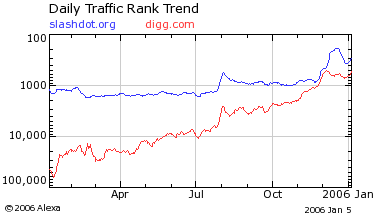 There's little question that Digg is one of the most likely candidates to take the lead from Slashdot. The numbers seem to bear that out. But what's more interesting to me is why Slashdot is on its way out.
There's little question that Digg is one of the most likely candidates to take the lead from Slashdot. The numbers seem to bear that out. But what's more interesting to me is why Slashdot is on its way out.
Community Participation and Judgment
There's always been a sense of frustration among those who submit news to Slashdot. Sometimes your story is picked and sometimes it isn't. After a while, you start to wonder why Slashdot's small group of dictators (err, I mean "editors") are qualified to decide what's interesting news.
Haven't we figured out that the crowd is generally smarter than any one individual in the crowd?
Sites like Digg and Reddit understand that. Even the popular page on del.icio.us provides a more useful insight into the collective mind of a small but active piece of the web. The only difference is that del.icio.us doesn't facilitate discussion. Both Digg and Reddit allow users to comment on any URL that's been posted.
For whatever reason, some people still think that Slashdot is a blog. I think of it as a message board in which only a small group of the members have the privileges required to create new posts.
It's interesting to note that Kuro5hin opened the editorial queue to their users for voting and comments but it never quite took off in the same way. I drifted away from the site a couple years ago, but suspect that it's a matter of focus. K5 has always placed more of an emphasis on writing, personal stories, and politics rather than what's hot now, spreading links or memes, and Google worship.
The Generation Gap
Let's face it. The Slashdot guys are getting old (just as I am!). But the core audience that fuels Slashdot has always been a fairly young crowd. Reading the comments now and then provides a window into who the regular contributors are:
- male
- geeks
- high school or college students or recent graduates
I know that's quite a generalization, but it's hard to deny that Slashdot would be anything without the core group of young geeks with more time than money. Every year that goes by is another year in the age gap between that group and the Slashdot editors.
Chad and I were discussing generation gaps in the Internet technologies world recently and decided that generations are roughly 7 years. We both agreed that it's going to be increasingly hard for Slashdot to stay relevant in the face of younger, more open services like Digg and Reddit.
Sure, they can find and promote some young new editors to introduce "new blood" into the process. But that's not the same. It's still Slashdot. The site has a voice, the community has a reputation, and the entire code base was written to support them. That stuff is hard to change.
January 08, 2006
Every Plane has its own Personality
 Given that we had mostly clear skies forecast for today and there was a 2 hour block open on the schedule, I decided late last night to go practice landings again today. I booked my old friend N5032G from 11:30–1:30 and arrived this morning to find it with a bit more than half full gas tanks. It's always nice when you don't have to mess with fueling the plane.
Given that we had mostly clear skies forecast for today and there was a 2 hour block open on the schedule, I decided late last night to go practice landings again today. I booked my old friend N5032G from 11:30–1:30 and arrived this morning to find it with a bit more than half full gas tanks. It's always nice when you don't have to mess with fueling the plane.
I completed my preflight checks, pushed it out to the line, got in, dialed up the ATIS, and called the tower to ask if I could head to the runway for pattern work. (That sounds better than "landing practice" doesn't it?) The day was shaping up to be good. There were broken clouds at 2,000 but like yesterday, they were mainly near the hills. The wind was calm as I taxied to the run-up area next to runway 31 Right.
Once my run-up checks were complete, the tower directed me to runway 31 Left and cleared me for takeoff. It had been a while since I'd flown this particular plane (I like toe brakes), and I was quickly reminded of how smoothly the engine runs.
I proceeded around the pattern and was cleared to land back on 31 Left. The landing felt... different. It wasn't bad, but it was somehow just a little different than I expected. The plane seemed to float a bit longer, touched down more lightly, but also felt more like it wanted to bounce.
It reminded me of something I tell myself (and often my instructor) every time I fly a new plane. It doesn't matter if you've flown other planes of the same make and model, every plane has its own personality. They're just different in subtle ways.
Over time, that doesn't matter much. You end up flying in the same fleet long enough and it becomes second nature, almost unconscious, to adjust to each one as you climb into the cockpit. But I'm not at that point yet. There are 4 or 5 planes in this rental fleet that I've flown, but I've only flown a few of them enough to make it semi-automatic.
Anyway, I ended up performing a total of 8 landings in the course of 1.5 hours. Unlike yesterday, I didn't get to do any touch-and-go landings. The pattern got a bit more crowded each time I came around. The best I could do is get clearance for an immediate back taxi on 31 Left and takeoff again. But several times I had to go around the long way and wait in line behind 5-7 other planes.
I guess I should have realized that the airport would be busy on one of the first decent flying Sundays we've had in a while.
Feedster Will Die in 2006
Is it just me, or has Feedster been completely useless for over 6 months now? I have no idea if it's related to the recent departure of Scott Rafer (former CEO) and Scott Johnson (former co-founder), but I'm amazed at how bad it is. And I should know. I've been a Feedster user from the first day it was announced, back when it was called "Roogle."
Ever since then, I've had a few Feedster keyword search subscriptions in my aggregator so I'd know when bloggers wrote about something I'm interested in: my name, my company, my favorite technology, etc. And for quite a while now the results have been abysmal. They've often been broken chunks of HTML from seemingly random blog posts that are months (or years!) old, and more than half are content scraping spam blogs.
About the only thing it's been useful for is finding the latest spam blogs to begin stealing my content. Technorati used to have that distinction but they've done an excellent job of cleaning up the spam.
Over a year ago a friend of mine got a job at Feedster. (I had introduced him to Scott.) Not long after that, we were driving up to San Francisco when I asked him a question. It went something like this:
What do you think Feedster's window of opportunity is? 6 months? 12? 18? They're clearly in a race to establish themselves in the market, carve out their space, and compete with Technorati before the Big Three build blog/rss search.
He hadn't really thought about it. I encouraged him to do so mainly because I think it's easy to get caught up in the fun and excitement of building while things are actually crumbling around you and your company is steadily loosing ground.
He wisely left Feedster in the middle of last year.
A lot of folks have been making predictions for 2006. Here is the first of mine: by the end of 2006, Feedster will be dead and buried. Technorati, on the other hand, will be just fine.
January 07, 2006
Citabria Training: Wheel Landings
Yesterday I had the chance to pick up my training again. I met Dave at Amelia Reid for a late afternoon flight in N9091L (which I'd not flown before) down to South County Airport so that I could try my hand at wheel landings.
Up until now, I've been focused on the classic "three point" landings. The goal is to get the main wheels and the tail wheel on the ground at the same time (or as close to that as possible). The technique is basically to stall the plane at the instant it touches down.
Wheel landings can be called "two point" landings. The goal is to get the main wheels down in a controlled fashion, slow down, and then bring the tail down. They're typically flown at higher approach speeds and are often used in gusty or crosswind conditions because of the extra control and safety they afford.
Yesterday
I flew us down to South County, checked the windsock and setup for a landing on runway 14. I wanted to get one three point landing under my belt first, since it'd been a few weeks. I made a decent landing and hit the power so we could get right back into the pattern.
Dave flew the second pattern and landing, so I could see a wheel landing from the front seat. (I'd only seen one from the rear the time I flew in N7807S.) He kept the speed to roughly 80MPH on the approach and got the stick forward right away. He got the tail down and gave me the plane.
I flew the third landing but ended up going around when the approach just didn't feel right and it seemed like I was eating up lots of runway. Then on the fourth landing, I ended up following a Cessna that flew a wide-ass pattern slowly. I was about to touch down and he still hadn't exited the runway, so I had to go around again.
The fifth time was a charm. I got the plane onto the runway at a decent speed and lowered the tail a bit. But I made the mistake of applying full power with the tail a bit off the ground yet. That resulted in the plane trying to take a left turn. I hadn't anticipated that with a bit of right rudder, so I had to fight it until we took off. Dave kind of laughed and said, "I should have warned you about that."
It was getting a bit late, so we headed back to Reid Hillview where I was able to perform one final wheel landing. Even though I've only performed two wheel landings so far, I already feel fairly comfortable doing them. I expected them to be a bit trickier but they're rather straightforward.
Today
I got the chance to take up N53893 today for some pattern work. Lance and Mark were also flying. That gave me someone else to watch when I wasn't flying. :-)
Anyway, I managed to get 10 landings in just under an hour despite the pattern being fairly busy. Since they were all "touch and go" landings, I didn't waste any time on the taxiway.
Flying two days in a row really helps. I feel like only 2 of my 10 landings didn't go quite as I would have liked. My worst landing today was better than my average landing on most other days. It was a good day.
I hope to get a few more hours of practice in before flying with Len again. If he's happy, I should be able to fly solo to a few nearby airports.
January 06, 2006
Publishing on the Edge will Change the Game
Keith Teare has published The first law of RSS (updated) which says:
The value of edge published data (say a post) is directly proportional to the velocity of it’s consumption and re-production, that is, the number of input and output operations it goes through each day.
And he's asking for feedback. I think he's right and that this is really a derivative of Metclafe's Law which says that:
... the value of a network equals approximately the square of the number of users of the system (n^2).
As the barriers and costs related to self-publishing have dropped to nearly zero, the sands are shifting yet again. Many worlds are feeling the effects: mainstream news publishing now needs to deal with blogs and "citizen journalists." The video/music/radio/media and entertainment world need to deal with non-label artists, podcasting, video, and P2P systems. The classifieds and on-line commerce world will need to deal with new challenges as well.
Keith and Mike are preparing to launch edgeio, which is designed to fit nicely into this new world. I've seen an early version of it and they've asked that I serve as one of their advisors. So consider that your disclaimer.
I really, really, really believe that few companies have begun to grasp how this new reality changes the landscape they're used to controlling. I've been evangelizing some of these ideas within a few groups at Yahoo in the past year but should probably step up that effort (especially since Keith calls us out!). I'm getting a stronger sense that 2006 is the year when it will start to matter in a big way.
January 05, 2006
Make Sure You're Not Building A Carboat
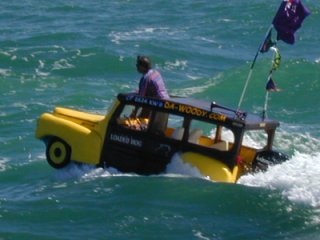 While discussing a product at work today, Caterina said something that really stuck with me. For whatever reason, I like her analogies. They work for me.
While discussing a product at work today, Caterina said something that really stuck with me. For whatever reason, I like her analogies. They work for me.
We were discussing a recent example of a product group that was trying to do what amounts to merging two things that really ought to be distinct. The end result, as you might imagine, is a product that does neither thing well.
She called that "building a carboat." And that immediately conjured up the image of a mis-conceived vehicle that "drives like a boat and floats like a car." While that's amusing to think about, it's easy to do when you're trying to please too many masters, designing by committee, or both.
I'm a big fan of consumer products that have one very clear and easy to articulate purpose. If you ever find yourself in the midst of building something that seems to be lacking that clarity, make sure to stop and ask yourself if you're building a carboat.
Bay Area Plane Lands on Highway
It's funny how just the other day I mentioned that it's rare for planes to develop non-fuel related engine problems. Well a two seat Piper Cherokee landed on I-680 yesterday afternoon after developing engine trouble. And it didn't run out of gas either. ;-)
According to the Mercury News:
No one was injured as the plane touched down near Mission Boulevard just before 3 p.m., clogging commute traffic only briefly.
An instructor pilot and a student had departed Reid-Hillview Airport in East San Jose at 2 p.m. They were on their way back when the two-seater Piper Cherokee 140 began encountering difficulties.
After the occupants warned the nearest airport, in Hayward, they landed on the freeway as motorists -- without any help from police or the California Highway Patrol -- slowed and made way for the aircraft. The white-and-blue plane then taxied to the right-hand shoulder along the southbound lanes.
It sounds like they did exactly what they should have done: they got the plane down safely.
There was some discussion at our safety seminar the other night about landing on roads. Len mentioned that landing on a road is often not the best option you have. But in this case, they seem to have picked a good one. I-680 is many lanes wide and basically straight in that area. When landing on a multi-lane highway like this, I suspect there are two major problems to watch out for:
- bridges and overpasses
- cars that don't see you coming
Luckily bridges and overpasses are usually spaced out enough that you can probably make it work if you're at a reasonable altitude. Dealing with traffic is more difficult. Those guys landing around 3pm when I-680 isn't yet wall to wall cars. They got lucky. At 5pm it would have been far more difficult to do.
If I was doing that in a plane where the engine completely quit (it sounds like they had partial power), I'd probably dive at the road and use the airspeed to hold the plane roughly 10 feet off the pavement until the energy dissipated. That'd give drivers a better chance of seeing me and reacting. Because, let's face it, most drivers aren't looking up at the sky our out of sunroofs when heading down the highway. So the longer you give the to slow down and make room, the better your chances are.
Anyway, I'm scheduled to fly at Reid-Hillview Airport this weekend. I'm sure there will be lots of hangar talk about this incident.
BTW, the picture at the right came from Steve Foster. He said:
A student pilot in our flight club hit a bird on takeoff. When landing, the damaged wing didn't have any lift and she slide off the side of the runway and flipped the plane. She walked away unharmed and was cool enough to shutdown the electrical systems and grab her purse and flight bag.
She had no hesitation returning to the air.
While aviation accidents aren't good to see, knowing that the pilots often walk away from them sure is encouraging.
Note to Bay Area Pilots: There's another FAA Safety Seminar tonight at the Radisson Plaza Hotel near SJC called "Do the Right Thing: Decision Making for Pilots." It looks to be an excellent session.
January 04, 2006
Sponsored Links Update
 Well, the last month has been entertaining and educational. After a month of having paid text link ads on my site, I've taken them down--just as I said I would. In the process I got to find out what a lot of people think about the practice of selling or buying "sponsored links" or "text link ads" on various sites.
Well, the last month has been entertaining and educational. After a month of having paid text link ads on my site, I've taken them down--just as I said I would. In the process I got to find out what a lot of people think about the practice of selling or buying "sponsored links" or "text link ads" on various sites.
I'm not going to rehash the whole debate, but for those tuning in late: The big controversy comes from the fact that one is "selling PageRank" rather than forcing publishers to earn it through good content, lots of links, and all that other stuff it takes. The search engines (one of which I work for) would rather that paid links be tagged with a rel="nofollow" attribute to indicate that any "link juice" or authority shouldn't be passed on to that site.
Now here's the thing that surprises me. There are many folks out there who don't care about buying PageRank, link juice, authority, or whatnot. Given the chance to buy a link that's been tagged with nofollow, they're willing to do so. In other words, some of the folks buying links really do see them as advertisements not just a way to "cheat" Google. They simply wan exposure.
I know this because some of them have asked me if they could advertise on my site. So may you'll see the sponsored links module reappear if they do. And if that happens, every one of them will have rel="nofollow" attributes (a poorly named attribute if I ever saw one). Perhaps link condom isn't such a bad name after all. :-)
Anyway, maybe I should put a blogroll back on my site in that space, just so I can link to Matt Cutts (without the "www" for those of you playing along at home; if you don't know why that's amusing, don't worry…).
January 03, 2006
FAA Wings Program and Safety Seminars
Earlier tonight I attended an FAA Safety Seminar called The What Ifs, presented by Lennert Von Clemm. (Interestingly, he was the instructor I flew with on my second supervised Citabria solo.)
The FAA regularly organizes safety lectures in the Bay Area. A couple months ago I attended one that presented an analysis of flight accidents in the Bay Area. It turns out the some accident types are six times more likely here due to our unusual weather patters and terrain. In other areas, we're right in line with the national averages.
Tonight's session, attended by roughly 30 pilots, was all about the things we need to think about before something goes wrong. Len talked a lot about engine failures (both partial and complete), getting caught in bad weather, and the value of being prepared for the unexpected.
He reminded us of something that most pilots know that I suspect most non-pilots never think about:
The single most common cause of engine failure in planes is... running out of gas.
That's right. It's not a mechanical problem at all. Now there are any number of reasons it can happen, but they're almost the result of poor planning, laziness, or hubris. Len had some great stories about local pilots, accidents, and almost accidents. Each of them served to reinforce the point.
These sessions count toward the FAA Wings program which encourages pilots to participate in ongoing training, including lectures, book study, and in-flight work with an instructor.
There are two main benefits to the Wings program:
- Pilots who participate can use their Wings experience to take the place of a Biennial Flight Review (BFR).
- Participation in Wings goes in your FAA record. If you ever get called I front of the FAA for a violation, they'll often take that into consideration. It's not exactly a "get out of jail free" card, but it's the next best thing.
Now I just need to remember to hang on to the paperwork and get my instructor to sign off on it. It's never too early to start accumulating Wings credit.
Inbox Cleanup Day
 I hereby declare today to be "inbox cleanup day."
I hereby declare today to be "inbox cleanup day."
Why? Because I've got a bunch of 2005 crap in my inbox and it's my first day back to work in 2006.
Besides, who wouldn’t want to start the year with an empty inbox?
Prepare to marvel as I make fast and furious use of the "delete" key and the ever useful Quick File extension for Thunderbird.
Oh, and stop sending me so damned much email.
Thanks!
January 02, 2006
Using Gmail as My Spam Filter
 It's been fun to watch the evolution of Gmail's spam filtering. In the early days, it was laughably bad. Even the most basic spam, the stuff that SpamAssassin would score in the 20+ range, would make it through.
It's been fun to watch the evolution of Gmail's spam filtering. In the early days, it was laughably bad. Even the most basic spam, the stuff that SpamAssassin would score in the 20+ range, would make it through.
But today things are quite a bit different. Based on my experience, the spam detection and filtering in Gmail is as good as Yahoo's SpamGuard. Though I don't regularly use Yahoo! Mail, we do have the benefit of SpamGuard on our corporate mail servers so I've developed a subjective notion of how much spam sneaks through both systems. At this point it's a draw. In any given day, I get maybe 15 – 25 spam messages on both systems. And I suspect they're both using virtually all the same techniques anyway.
But all along, I've been popping my personal email into Thurderbird from my own mail server, which runs a combination of spam-fighting stuff. And just the other day I realized how much less effective it is. Even after training Thunderbird's spam filter for months, the combination of SpamAssassin and Thunderbird are far less effective. I still end up with 75 – 100 spams a day in Thunderbiard, when Gmail is knocking out most of 'em.
The only logical thing to do was take advantage of Gmail's spam filtering and secure POP access.
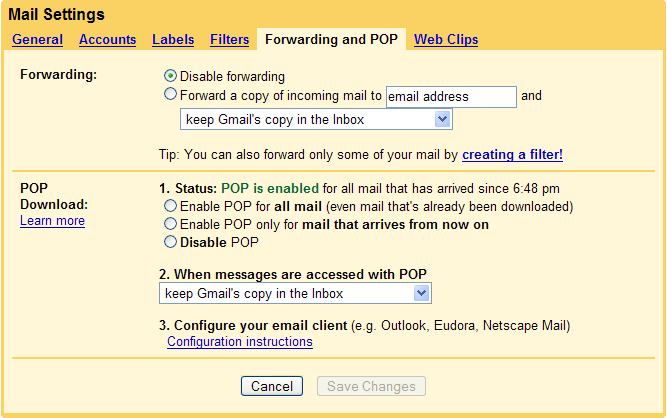
Gmail makes it easy to turn on POP access to your inbox and even gives you smart choices about what to do with the Gmail copies once you've popped your mail:
- keep Gmail's copy in the Inbox
- archive Gmail's copy
- delete Gmail's copy
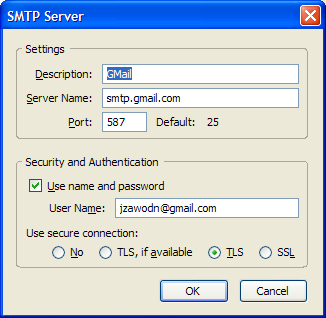 That, combined with the fact that you even get secure (meaning encrypted) POP access and the ability to use Gmail as your SMTP relay (once you setup SMTP AUTH in your mail client) tells me one thing:
That, combined with the fact that you even get secure (meaning encrypted) POP access and the ability to use Gmail as your SMTP relay (once you setup SMTP AUTH in your mail client) tells me one thing:
The folks behind Gmail are trying to give everyone the sort of power and flexibility that used to come only with running your own mail server.
The results so far have been impressive. I'm spending less time dealing with the crap that used to end up in my inbox. Gmail is usable at home, on the road, and at conferences with unsecured networks.
This all makes me wonder if it's worth it for smaller organizations to bother running their own mail servers anymore. If Google offered small business mail the way Yahoo does, there'd be some serious competition in the market and it'd make a lot of people's lives much easier.
For the last 10 years I've helped run the various services for WCNet, a community ISP in northwestern Ohio. We have roughly 15,000 users and get a lot of spam. Even with greylisting, which helps a lot, we're still dealing with a lot of spam. (Postgrey kicks ass as a greylisting implementation for Postfix.)
Amusing side note: WCNet used to stand for "Woody County FreeNet" but the notion of a FreeNet is pretty old, and the service has grown to cover much of northern Ohio and southern Michigan. So we just call it WCNet these days. :-)
January 01, 2006
You Never Forget Your First Web Server
It was nearly 10 years ago (mid 1996) that I first put my own web server on the Internet. Back in college, I managed to convince one of the staff to give my personal computer a static IP address so that I could run a web server. At the time there were no other student computers on the campus network, let alone with static addresses.
It was a year of firsts for me and for the University.
At the time my nearly state of the art computer was a 486 DX2/66 with 16MB of RAM running Linux 2.0.0. (I still remember upgrading from 1.x.x.) The computer lived at the address pizza.bgsu.edu (that link goes to the Internet Archive, where you can see pizza's old home page). I put my homepage there, as did several friends. We used telnet (gasp!) to login and update things.
I remember spending something like $100 for the Ethernet card, a 3Com 509 with 10base2, 10base-T, and "thick" ethernet. Computers didn't all come with built-in network ports back then. And $100 was a lot of money for a lowly undergrad. But being in the Internet was important to me.
I remember learning Perl and CGI programming in 1996 too. In fact, I built my first "web application" that year and ran it for a few years. Sadly, the Internet Archive never captured the "Vote on Bowling Green's Best Pizza" site I had built. It became quite popular on campus (among those who used the web, at least!)
That application led to the student government paying me $400 a year or so later to build the first on-line voting system. That's right, back in 1997 or 1998 we had the option of voting on-line for our student government elections. That involved more Perl code (complete with socket programming) and a little flat-file database system (with locking) to hold the data. No PHP, no MySQL.
That experience led to a few side jobs doing "web programming" (for rates that seemed really high back then, but it was the beginning of Bubble 1.0), an 8 month systems administration internship in the Computer Science Department, turning down the chance to work at Yahoo! (back in 1997 or so, but that's a story for another day), a longer-running co-op with Marathon Oil Company doing Intranet and Internet Web development, graduation, a full-time job at Marathon, and ultimately moving to California to work for Yahoo in late 1999.
Anyway, the first web server stayed on the school network for a few years and eventually saw a motherboard upgrade. (Remember when we used to upgrade motherboards instead of buying completely new computers?) It then became what it is today: a Pentium 133 with 96MB of RAM running Linux. It went on to be my home Linux server for years, gaining a second network card (it was my gateway/firewall before Linksys made such devices), CD-ROM drive, and so on.
Now, 10 years later I'm giving it away on craigslist. My own little piece of history that no longer serves a practical purpose and nobody is likely to pay money for it. But it still works. ;-)
What do you remember about your first web server?
